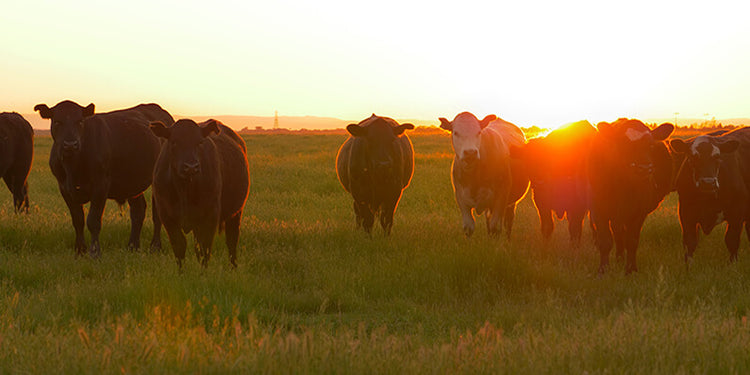In a world where certain agricultural decisions are made based on public perception, stress has been a highly discussed and researched topic. As more research is done, we shed light on potential stressors and how much they can affect performance as an industry.
Any number of factors can cause stress, and each species, breed, and individual animal will respond differently. A common stressor in cattle is caused by weather conditions and temperatures, otherwise known as heat stress or cold stress. Cattle have a narrow thermoneutral zone, meaning there is little wiggle room between what cattle perceive as too hot or too cold. Cattle begin heat stress at 77° F and cold stress at 32° F in dry, non-windy conditions. Once outside of the thermoneutral zone, cattle expend energy to maintain temperature as best they can. This energy expense could have otherwise been used for production, and therefore is a costly stressor.
Animal handling is another common stressor—cattle like routine. Therefore, stress is caused when they are taken out of their usual environment and handled by humans. Handling cattle can be necessary to treat illnesses, provide vaccines, castration, implement animal IDs such as ear tags, etc. While this may be routine practice for the producer, cattle quickly get stressed from the event. As prey animals, cattle like to be able to see in front of them and don’t like sharp corners because they can’t see around them. Based on this knowledge, the industry has completely revolutionized chute systems to be more suited to bovine behavior.
What does stress do?
Stress can negatively affect several systems within the body. For example, stress decreases immune function, production, reproduction & fertility, lack of body condition maintenance, and the list goes on.
How does stress affect production?
After a day of working cattle, you may notice they go off feed for a day or two. When stressed, cattle go into “fight or flight” mode, and with cattle being prey animals, they naturally lean towards flight. In this mode, energy and blood are directed towards vital functions and organs. The stomach is not one of these, so decreased rumination is observed in stressed animals. Reduced rumination leads to decreased intake, leading to increased susceptibility for illness and a lack of gain. (Learn more about Ruminant Nutrition Here)
Hormonal changes occur during times of stress, as well. Stress causes oxytocin release to decline, lowering milk production. Adrenocorticotropin is released from the brain in times of high stress and causes immune suppression. Cortisol and lactic acid can lead to altered flavor and toughness of meat products.
Death loss, poor quality meat, and decreased production of both meat and milk are factors of stress that will directly impact your bottom dollar and, therefore, should be taken under significant consideration.
What can AgriGro do?
AgriGro offers NutriZyme®, an all-natural feed & water additive. While we can’t eliminate stress, we can help to prevent and combat its affects. NutriZyme® combats stress by increasing appetite and enhancing healthy gut bacteria to boost digestion. Additionally, immune responses are augmented to keep animals healthy during times of high stress.
Contact a rep or click here to learn more about incorporating Nutri-Zyme® into your production.
 Order Now Contact a Representative
Order Now Contact a Representative


